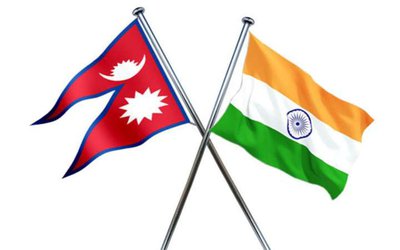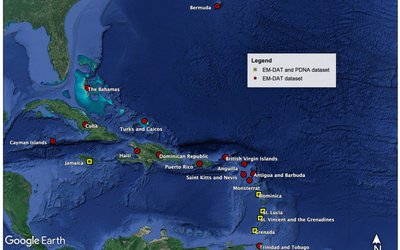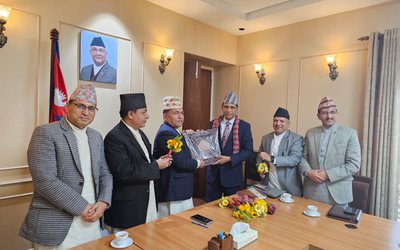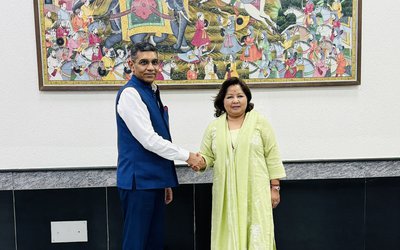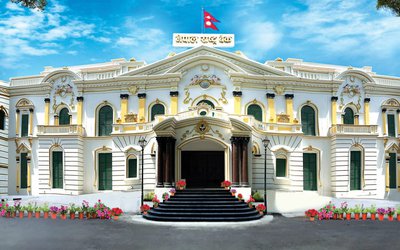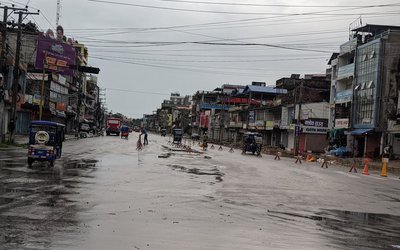
The CPN UML and the Maoist Center, holding nearly two-thirds seats in federal parliament and six of the seven provincial assemblies, decided to support UML Chair Oli to head the next government and leaders of the two parties reached the President’s office to show their majority. This happened little before Deuba, then head of government, announced his resignation. President Bhandari wasted no time in appointing Oli Prime Minister on 15 February 2018.Oli also included two more ministers from his own party and his efforts to include a few on the very day from the Maoist Centre did not materialize as the Center refused to send anyone immediately. This decision of the Maoist Center to remain out of the government temporarily was a bit disappointing but several rounds of one-on-one between Oli and Prachanda were encouraging and gave no chance for either party concerned to backtrack. As a result of encouraging discussion between the two top leaders, the Party Unification Coordination Committee (PUCC) formed by the two parties could function well to reach conclusion without much delay. Expectedly, following weeks of intense negotiations, the two parties signed a seven-point deal to unify and share power in government. It is interesting that despite news of the two leaders leading the government and the unified party on rotation, major leaders belonging to UML have not agreed to it openly. It is learned that the deal struck includes an agreement of both sides on the name (the Nepal Communist Party), a small size of the standing committee, politburo and central committee and Marxism and Leninism as the ideological stand of the unified party pending a decision of its general convention on the party’s ideology. It was also reported that the deal covered other aspects such as the two supreme leaders (Parchanda and Dahal) to take turns to become the prime minister and distribution of key posts such as president, vice-president, speaker and deputy speaker of the parliament. It looks like Oli will need some time to give full shape to the Cabinet because a power-sharing issue is taking time and it took time to ascertain the number of ministries. The two parties have agreed to have 18 ministries, 11 for UML and 7 for the Maoist Centre. If the efforts of the two left parties in getting Sanghiya Samajbadi Forum-Nepal’s participation in the government succeeds, the two parties will have to sacrifice about three ministries if the idea is not to push the number beyond 18.The left alliance is said to be moving closer to bringing the Madhes-based party into the ruling coalition, committing to openness for a constitutional amendment in consensus. The understanding between the two constituents of the left alliance is that 11 ministers will be from the UML, including the prime minister, and seven from the Maoist Centre, which is way below the constitutionally permissible number of 25.Another challenging task before the two leaders is to select leaders from their respective sides for induction into the government maintaining a balance in relation to factors such as geography, ethnicity, gender, etc. It is a well-understood fact that Cabinet expansion is not an easy job especially when one is faced with the daunting task of accommodating in the government too many interested leaders from both sides. Oli and Prachanda cautiously decided to include only four more ministers, two from each side, to the Cabinet on February 26. Beyond any doubt, inter-party differences over power-sharing and ideological issues and intra-party feuding in both parties have caused some delay in giving the Cabinet its full shape but some decisions taken by the top leadership abundantly manifest their resolve to hit the target, party unification, soon. Very smartly, they did not allow the debate on the ideology of the two parties to continue, which could have obstructed progress on other fronts had it not been deferred for further discussion in the general convention of the unified party. Moreover, the two left alliance task forces formed a few days ago to finalize interim statute of the unified party and political document has been given 15 days to come up with their reports. Looking at works of different nature proceeding satisfactorily on different fronts, it looks like the two left parties are just moving ahead with their backs at the wall, overcoming impediments and clearing confusions that surface intermittently. The left parties, however, are likely to have a tough time with the Nepali Congress (NC) as the Oli-led government has already revoked one and is likely to revoke some more highly controversial decisions of the caretaker government led by its president Ser Bahadur Deuba.
Indeed, the left alliance had threatened to revoke some decisions taken by the Deuba-led government alleging it violated the conventions of a caretaker government. It is perplexing that the government kept on announcing social-security related decisions with long-term implications even in the midst of extensive criticism. It may not be inappropriate to mention that decisions related to lowering of age to 65 for a stipend to elderly people, an additional Rs.100, 000 to each earthquake affected household, etc were found untimely and not implementable by the concerned officials, let alone the opposition parties.Deuba could not garner adequate support in favor of his decisions from his own colleagues in NC. In utter disregard of wide-spread criticism and serious reservations within his own party, Deuba went on to nominate three people to the Upper House of the Parliament at a time when K.P. Oli was almost ready to knock the President’s door for his appointment as the next head of government. Being aware of the controversy created by the decisions of the caretaker government and knowing well that Deuba had only a day or two left as head of government, President Bidya Bhandari did not oblige him and sat on his recommendation\nomination. Expectedly, the nomination-related decision of the erstwhile government was withdrawn by Oli and the President put her seal of approval on his decision to nominate three people to the Upper House. The NC protested the action of the President and mobilized its sister concerns two of which took to the streets in turn to denounce the decision. Although the President has been urged by the party and its other concerns to withdraw the decision, observers find this protest, lacking public sympathy and support, nothing more than symbolic. The NC is not likely to get the desired level of public cooperation in its protests because many observers, including NC supporters, feel that Deuba should have avoided making policy decisions and decisions that could commit the new government. Legal experts suggest that an outgoing government should not have increased allowances or nominated people to the Upper House of the Parliament. Since avoiding these kinds of decisions is a matter of constitutional convention for an outgoing\caretaker government and not a written code, some loyalists in the party believe that there was nothing wrong in making the decisions by Deuba at a time when he had not even communicated his intention to resign to the President. All said and done, it is difficult to disagree with people who think that compared to these decisions related to increases in allowances and nomination, his earlier decision pertaining to the appointment of governors, which was a must and was taken after rounds of consultation with other political parties, was timely and appropriate. As far as successful holding of local, provincial and parliamentary elections is concerned, Deuba had done commendable work on the foundation created by Prachanda but foiled the opportunity to walk out tall with bags full of political capital for him and his party, basically on account of his numerous controversial decisions taken in haste at a time when people and the President knew he had only a couple of days left to vacate the chair for Oli.Irrespective of what is felt and said, NC is not likely to let the issue die down soon as is evident by the fact that the three individuals recommended by the erstwhile government have moved the Supreme Court demanding their own appointment to the National Assembly. The apex court has directed the government and the parliament to stop the scheduled swearing-in of the recently appointed three members of the National Assembly. This decision of the court must have provided some solace to NC, which was finding it difficult to get adequate support to raise the issue effectively.Oli may have already sensed that the opposition party (NC) is desperately on the lookout to find a reasonable issue to mount an attack on the ruling parties so that the disappointed party workers, after the electoral thrashing, could be energized and rejuvenated. Moreover, the factional feud within UML, in addition to power tussle with the Maoist Center, seen in the form of pressure exerted by second-rung leaders on the leadership for a rightful place either in the government or in the unified party, must have been a matter of anxiety for the newly appointed Prime Minister. In any case, both the leaders are likely to leave a large number of leaders in their respective parties offended because the row over portfolios does not look easily resolvable. In addition to a myriad of problems on the political front, Oli is also not inheriting a healthy economy.
It has been written and spoken umpteen times that the growth this year will be much less than what is projected in the annual budget. Capital expenditure has remained sluggish, reaching only 20 percent of the allocated Rs.335 billion in seven months. It seems economy’s external sector is on a perennial decline with imports of everything ranging from fruits to fuel increasing over time. It may be mentioned that the amount spent on import of fossil fuel (Rs. 75.2billion) in the last six months is nearly twice as much as the total earnings from merchandise exports (Rs.41.1 billion).Compared to the six months of last fiscal year, fuel import in the six months of this year has gone up by 20 percent. The new government is likely to face increasing demand for resources\funds by the 7 provinces, irrespective of their varying absorbing capacities. It is learned that Rs.15o billion has already been disbursed to local bodies and Rs. 75 billion will have to be sent soon. It may also be noted that expenditures for the two houses of parliament and the provincial assemblies will be at least 3 times (Rs.4.25 billion) that of the previous constituent assembly-turned parliament, which approximated Rs.1.40 billion. The 7 provincial assemblies and their secretariats will account for about 60 percent of Rs. 4.25 billion. This huge increase in expenditure will have to be matched by speeded development activities and a much improved local delivery mechanism to justify introduction and continuity of the federal system of governance. These huge expenditure figures are worrisome when looked at from the angel of sluggish growth of the economy and revenue collection which is unlikely to meet the target of Rs.730 billion this fiscal year. It is worth mentioning that revenue collection doubled in 5 years from Rs.296 billion in 2069\70 to Rs. 601 billion in 2073\74 fiscal year. In 2074\75, actual revenue collection exceeded the target of Rs. 566 billion by Rs. 43 billion. Our leaders have to learn to be worried about our economy like other world leaders such as President Trump of the United States who looks and sounds worried about the trade deficit of 500 billion dollars that his country suffered from China last year. Prime Minister Oli may also note that President Xi of China is almost certain to get a third term, through a constitutional amendment, because Chinese feel they need him for some more time to take the country to the tip of economic prosperity.

Dr. Tilak Rawal
Dr. Rawal is former governor of NRB.
- Six Months Of Deuba And Oli
- Jan 25, 2025
- Prachanda Outsmarted
- Jul 19, 2024
- Prachanda Outsmarts Again
- Apr 14, 2024
- Prachanda Completes One Year
- Jan 26, 2024
- Terrible Times To Continue
- Oct 12, 2023
